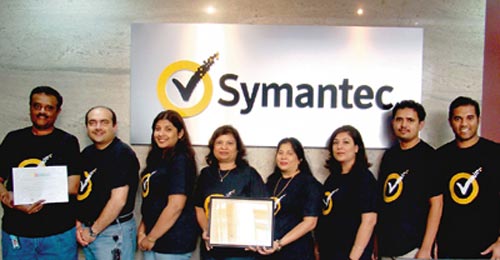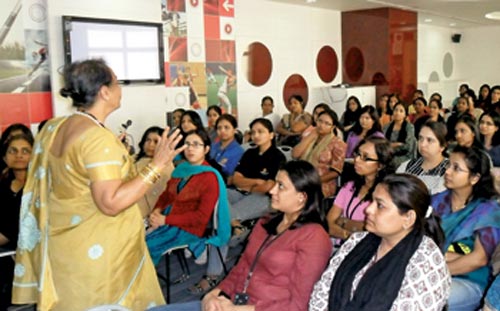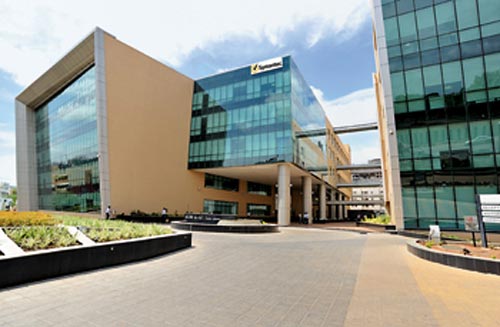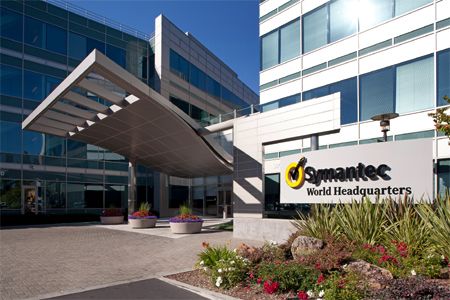
As consumers around the world create more data, innovative techies must find ways to secure it. And if you have the passion for innovation, Symantec could be a great place for you to start.
Company Fast Facts
Core business: Security, backup and availability solutions
Global turnover FY12: $6.7 billion
Employee strength: 18,500 (global); 4000 (India site)
Global headquarters: Mountain View, California
India centres: Pune, Chennai, Bangalore
Websites: Symantec.com, Linkedin.com/company/Symantec
Chances are that if you've used a desktop or laptop, you may have installed an antivirus software to protect it from viruses, spyware, Internet threats.
In today's times, one is even advised to install security software to on your smartphone, which has massive amounts of data and 24/7 Internet access.
Norton antivirus, one of the world's most downloaded security softwares is a product of Symantec, a global leader in security, backup and availability solutions.
"Our innovative products and services protect people and information in any environment -- from the smallest mobile device, to the enterprise data centre, to cloud-based systems," shares Sudhanshu Pandit, Director, HR, Symantec India.
Innovation is key
To be a leader in its field, Symantec must continuously innovate its products to keep up with the changing needs of its customers.
One such innovation is V-Ray, which helps to avoid backing up huge amounts of redundant data by making duplicate files visible. Another is Symantec Insight.
Powered by over 210 million systems from over 200 countries, Insight seeks out changing encryption and mutating code and separates files prone to risk from those that are safe.
Till date, Insight is responsible for directly blocking over 8.7 million attacks and assisting 31 million more in a total of 3.1 billion files that have been tracked!
Symantec's prominent products/services
Net Backup 7.5 and Backup Exec 2012: Enables 100 times faster backup, eases management and simplifies recovery if a disaster occurs.
Symantec Endpoint Protection 12: Provides unmatched protection using Insight, Symantec's community and cloud-based reputation technology, to detect and block new threats earlier and more accurately, faster and more effectively.
Symantec's Insight is responsible for directly blocking over 8.7 million attacks and assisting 31 million more in a total of 3.1 billion files that have been tracked.
Please click NEXT to continue reading...

Symantec's India centres
Founded in 1982 by visionary computer scientists, Symantec has operations in over 50 countries, today. Of this, 35 percent of the company's global research and development talent is located in India.
Its largest Centre of Innovation is in Pune with other engineering centres in Chennai and Bangalore. At these sites, engineers undertake the complete breadth of high-end product development, including design and development of new technology, product enhancements, sustenance activities and technical support to global customers.
Global imprint
Almost every product in the Symantec portfolio has a representation in India spanning enterprise products to consumer services.
For instance, the Security Response Lab (SRL) in Pune and the SOC in Chennai provide customers globally the most comprehensive and up-to-date threat intelligence possible.
India patents
Experts at the Chennai Security Operations Centre (SOC) provide real-time threat monitoring, analysis and remediation guidance to customers to help them minimise the impact of security incidents on their business operations and reduce their overall IT risk.
Symantec Innovation Centres in India have over 163 patents to date.

According to Symantec, it plans to continue hiring engineers with a Computer Science or IT specialisation, as well as those with an MCA and MCS qualification, for their Indian operations in Pune, Chennai and Bangalore.
Over ten percent of the total recruitments are made through campus placements, and in 2011, the company recruited from the top tier engineering colleges including IITs, NITs, BITS, apart from others, for technical profiles.
In this interview, Sudhanshu Pandit, director, HR, Symantec tells us more about the company and what they look for in candidates:
Symantec's challenges in the digital age
The digital information getting created everyday is increasing exponentially. How to protect, manage and secure this data, is a big challenge for our customers.
Also, earlier in the security space, the attacks were for some sort of thrill. But today, attacks are clearly for specific gains -- financial fraud or activities to sabotage systems and organisations.
Third, the kind of end points in terms of protecting is changing dramatically; earlier it was desktops, then laptops, now mobiles and tablets. So, that's where we need to make a difference in terms of our products in the future.
What's the R&D focus on in India?
In India, Symantec spends heavily on product development. Very little on sales and marketing.
Are students savvy about what goes into product development?
In India, where demand is more driven by software services, it's unfair to expect that students will be aware of what goes into product development. But we make sure they have the computer science engineering and operating system concepts, as then we feel confident in bringing them up to speed with the whole product development mindset.
What's this 'product development mindset?'
To stay or persevere with a particular problem, develop a better solution to the same challenge over and over again, maybe bring in innovations to solve similar kinds of problems and deploy that in very diverse technology situations.
When a software is released, it's refined for multiple versions. That's how great products are built over a period of time, whereas in software services, you move from one project, technology or customer to the next, solving different problems, requirements. That's the key difference between the services and product industry.
Any soft skills areas engineers must work on?
Primarily speaking. If you give a student a pen and paper and ask him to write a programme or solve a complex problem, they're better off doing that, but struggle if you ask them to describe it in simple English.
When working in global teams, they don't have the luxury of visual communication. So, it's essentially the tone and language that they have to depend on, and that's an area they are traditionally not strong at.

At the entry level, Symantec hires for two roles.
In software development, engineers create solutions using different programming languages such as Java and C++, which help end-users protect, store and access their data.
This involves building software that works to provide the desired outcome. On the other hand, the software testing team is responsible for identifying flaws, gaps and bugs in the code, and provide feedback on the stability of the software to improve the product.
Their role involves improving the quality of software. Are both equally challenging? According to Sudhanshu, there's a spectrum of complexities in both streams.
"It's not generically appropriate to say that one is simpler than the other," he reflects. Together, the developer and the tester build dependable software solutions for effective security, storage and management of customer information.
Campus selection process
Typically, there are three rounds -- technical written test, multiple technical interviews and HR interview, and may take up to two days to complete.
On Day 1, a preliminary written test is conducted where applicants are given multiple choice questions, including computer science problems and fundamentals.
The list of students qualifying this round is announced at the end of the day. The following day, applicants face a panel of interviewers.
Technical fundamentals, a must
The questions are technical as the work involved is extremely challenging.
What will give you an edge?
"One needs to be extremely proficient in the areas of computer science engineering including operating system concepts, data structures, algorithms, data bases and networking," shares Sudhanshu.
In addition to these, entry level applicants need to have a strong hold over programming. Communication skills are a great bonus, since engineers work in global teams. However, technical skills are the primary requirement.
Beyond campus recruitment
If Symantec does not come to your campus, Sudhanshu recommends two interfaces for job seekers -- the Careers section at Symantec.com and the company's LinkedIn page, which both have job postings at different levels.
The selection process involves multiple rounds of technical and non-technical interviews. Sudhanshu advises students to get onto LinkedIn early on in their careers and even while in college, but suggests you keep your profile more professional as opposed to a social media sites like Facebook.
The company is now also exploring the prospect of hiring differently-abled. "Given that there is very little physical that's involved, a person on a wheelchair can easily be in mainstream software development," says Sudhanshu.

Besides competitive remuneration and several employee benefits, an exciting prospect at Symantec for aspiring product development professionals is that you will get an opportunity to work on cutting-edge technologies in cloud, virtualisation and security, as well as alongside the well-qualified experts in the industry, developing solutions for real-world problems.
A good example is Symantec's Security Research Lab in Pune, which is part of Symantec's Global Intelligence Network (GIN), which includes security researchers throughout the world collecting information about online fraud, malicious code, and security risks, analysing them, and then developing real time updates to the Symantec products that protect computers at homes and in workplaces around the world.
Becoming a 'Symantechie'
Freshers are exposed to a variety of software and challenging situations in the organisation.
While there are many opportunities to grow within the company, Sudhanshu offers some parting advice to all freshers.
"I recently had a candidate with eight years of experience and six companies on his resume! I can tell you, that does not go down well with companies!" he shares. So, indiscriminate job-hopping is a no-no.
Be patient and focus on growing your domain knowledge and skills. Sudhanshu also emphasises the importance of networking. Zero in on national and international organisations in your field.
For instance, NASSCOM has a number of forums -- if interested in security you can explore Data Security Council of India. "Communicating your capabilities to the right people is important, " Sudanshu rounds up.